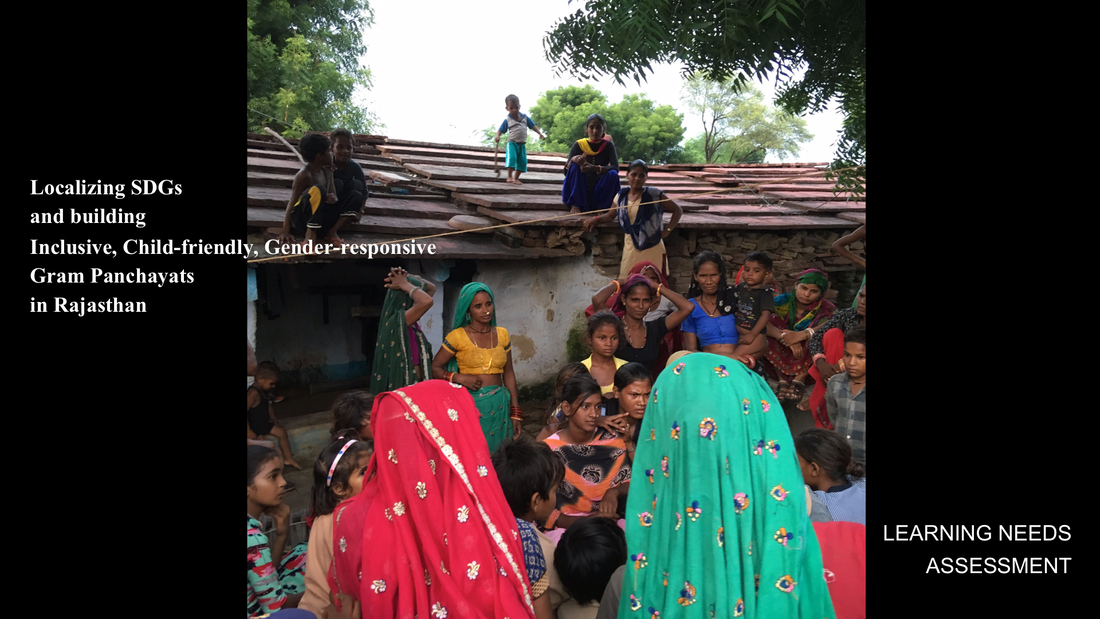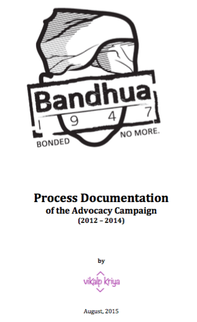Learning Needs Assessment
|
Localising SDGs & building inclusive, child-friendly, gender-responsive Gram Panchayats in Rajasthan
The scope of the learning needs assessment extended across four distinct geographies in the state – southern tribal region, eastern ravines region, central/northern plains region and western desert region. The qualitative study included KIIs, FGDs, Workshops and review of secondary data covering eight districts, eight blocks, eight gram panchayats and three panchayat training centres.
|
An excerpt from the report: In village after village, there seemed to be an air of gloom, a sense of despair. Ward Sabhas are unheard of. The intent of Mahila Sabhas is beyond comprehension. Gram Sabhas are marked by poor attendance. And to fulfill the quorum, it is at best “manipulation”, if one may borrow the term from Sherry Arnstein’s Ladder of Citizen Participation. “You just need to announce that a new list of beneficiaries is getting prepared and they come running in hordes”, one of the VDOs confided in us. As a result, the idea of Gram Panchayat is reduced to an institution that doles out schemes. And people (rights holders) to beneficiaries. Caste continues to rule. Patriarchy is all pervasive. Gram Swaraj remains a cherished dream! |
Process Documentation
|
Bandhua 1947
A national-level advocacy campaign against bonded labour |
An excerpt from the report: Holding his release certificate, a 35-year-old man recounts the time when he was bonded. At that time he was nine years old and studying in Class IV. His elder brother, who was in bondage with the village landlord, had escaped. As a result, the village panchayat ordered that as compensation the younger brother would now have to serve the landlord. For years he was paid Rs.500/- per month and given one meal of ragi a day. He had to water plants, guard the field during nights, and also take care of domestic chores. It was only during the festival (once in a year) that he was served rice in meal. He was not allowed to rest for more than three hours daily and on days when he felt tired or sick was soon reminded of the huge amount he owed (though the exact amount was never revealed). It came as a shock when at the time of release the owner said that the loan amount was Rs.45,000/-. All these years he did not dare to run away from bondage since he had the responsibility of his mother and sister. |
Qualitative Study
|
Health Sector Response to
Violence against Women in Maharashtra |
An excerpt from the report: “Pratyekichya ghari matichya chuli” – said by one of the participant at the close of a focus group discussion, the statement literally translates as “every house has a clay oven”, but the idiom in Marathi means “every house has the same story”. The qualitative study followed an approach termed as “from the inside out” which is in contrast with the “from the outside in” approach in terms of perspective, method and therefore outcome. This is reflected in the question: “What do these women see themselves doing / how do they describe their experiences? As different from the question: “What do I see these women doing / how will I describe their experiences?” In this research the language and categories of analysis used by the group become the framework or lens through which the data is viewed and analysed. |
Qualitative Study
|
Employability, Entrepreneurship & Empowerment of Women
|
A study to assess the efficiency and effectiveness of SALONi, a GCPL initiative as part of Godrej Good & Green vision
The study tried to understand the value that women and girls attributed to the SALON-i programme in bringing about a change in their social and economic context in relation to the key terms - “employability”, “entrepreneurship” and “empowerment” – articulated as the intent of the SALON-i programme. |
Qualitative Study
|
Training Programme on Rural Entrepreneurship for Women in District Latur, Maharashtra
"Why are you asking my expectations? Will you be able to fulfill it?”
– asked one of the participants |
The objective of the study was to assess the effectiveness (outcomes and impact) of the intervention at the personal, familial and community level, and deliberate on the scope of further strengthening the engagement and the way forward
|
Chhattisgarh State Plan of Action for Children
Field visits and consultations with children and duty bearers




